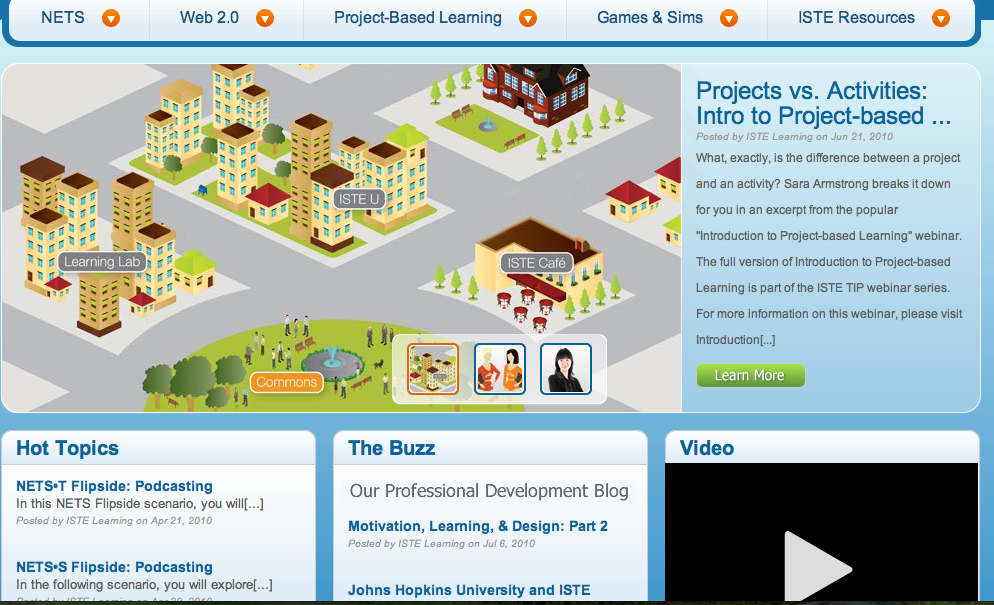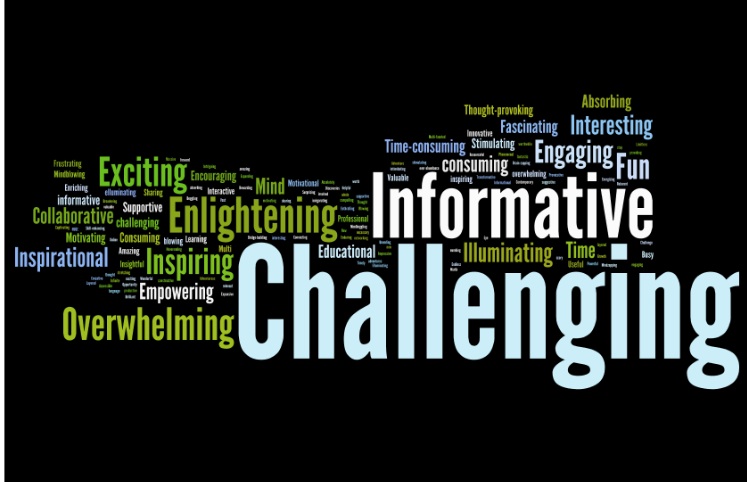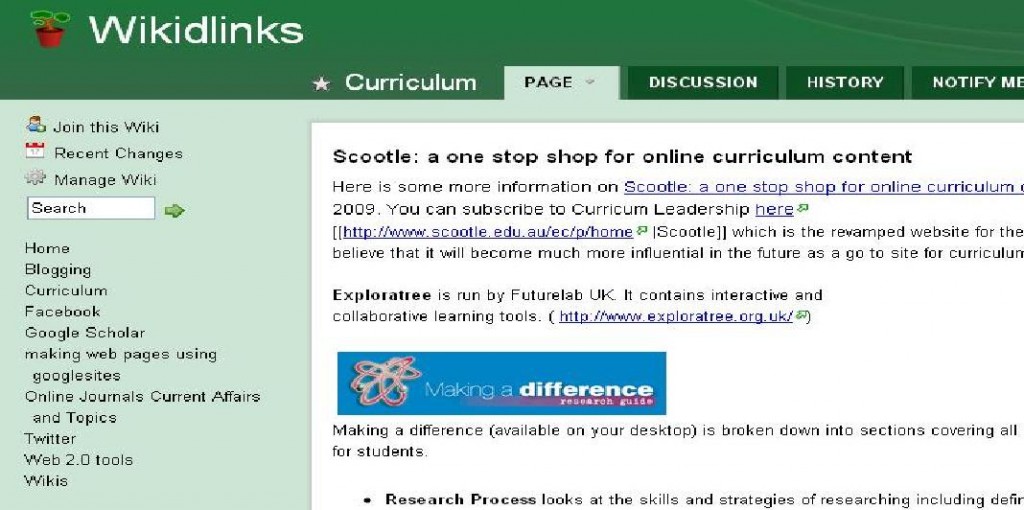Heidi Hayes Jacobs, editor of Curriculum 21: Essential Education for a Changing World, talks about the book, the contributors, and the ideas!DR. HEIDI HAYES JACOBS, Executive Director of the Curriculum Mapping Institute and President of Curriculum Designers, Inc., is an internationally recognized expert in the fields of curriculum and instruction. Dr. Jacobs is the founder of Curriculum Designers, Inc., a company committed to helping educational systems implement integrated and more effective curriculum. She has served as an education consultant to schools nationally and internationally. She works with schools K-12 on issues and practices pertaining to: curriculum reform, instructional strategies to encourage critical thinking, and strategic planning.
Tag Archives: Professional learning
ISTE learning
Recently The Journal revealed a new and exciting site for professional learning for educators worldwide. ISTE Launches Professional Development Site for Ed Tech at Annual Conference explains how:
At its annual conference this week in Denver, the International Society for Technology in Education (ISTE) launched ISTE Learning, its own professional development Web site for the entire spectrum of education technology. The organization has designed ISTE Learning to serve as both a extensive resource for education professionals’ technology-related needs and interests and an online meeting place for exchanging ideas, sharing best practices, and finding answers.
According to ISTE, the goal of the new site is to help educators incorporate all facets of education technology into their students’ learning environments, specifically by showing them the myriad of ways that students themselves already use popular technology.
ISTE learning encompasses
- The Commons “Anytime, anywhere professional learning with bite-sized video, articles, and audio.”
- Learning Labs “Hands-on, self-paced learning embedded in the NETS for application in the classroom.“
- ISTE cafe “Stop for a latte, stay for the learning community and participate in a vibrant PLN.”
- ISTE U “Develop and grow your professional learning e-Portfolio.”
Certainly well worth a look!
PLN Program Round 2
Create your own video slideshow at animoto.com.
The School Library Association of Victoria in partnership with the State Library of Victoria present the PLN – Personal Learning Network program. This program is funded as part of the digital education content initiatives and strategies of the Victorian Department of Education and Early Childhood Development.
Your PLN is a reciprocal learning system designed just for you!
- Create your own personalised learning network and share information, opinions and experiences with like-minded people from across the globe,
- Apply a little intelligent filtering to the information overload out there,
- Learn from others and contribute to others’ learning,
- Connect around ideas that you are passionate about.
Find out how you can use the web 2.0 environment to:
- Expand your personal learning network,
- Manage the information that web 2.0 provides,
- Use web 2.0 for learning and teaching,
- Develop your skills and experience in a web 2.0 environment.
This twelve week online program, enhanced with regular Elluminate how-to sessions, exemplars, and online mentoring offers you a hands-on experience of a range of web 2.0 tools and activities.
This program is designed for novices to the web 2.0 world as well as those who wish to further explore this interactive web environment.
When: Commencing Monday 26 2010
Who: Teacher-librarians, teachers and library team members
How: Work at your own pace, explore new things week by week, share your learning as a team!
Why: So that you build a network of trusted sources for learning and collaboration.
Cost: $175 per person for SLAV members – team discounts apply!
The registration form is now available here!
Have a look at the Wordle of how Round 1 participants described the PLN:
Please join us!
Dr Joyce Valenza @ SLAV!
The School Library Association of Victoria is proud and pleased to announce that renowned international and online presenter, Dr. Joyce Valenza is coming to Melbourne. Joyce will be speaking at the Make, Share, Do professional learning day to be held at the Olympic Room, Melbourne Cricket Ground on Friday 30th July. Places are limited, so please contact the SLAV office as soon as possible to ensure your place at this very special event.
Joyce Valenza is the teacher librarian at Springfield Township High School in Philadelphia. She says;
This is the best time in history to be a teacher librarian. Major shifts in our information and communication landscapes present new opportunities for librarians to teach and lead in areas that were always considered part of their role, helping learners of all ages effectively use, manage, evaluate, organize and communicate information, and to love reading in its glorious new variety.
Dr Valenza’s innovative and practical advice to guide learners in new and emerging information and communications landscapes has received global attention and acclaim across the international education community.
Alan November – How Can We Make Change?
Recently Alan November spoke at the ACEC2010 Conference. On his ‘soapbox’ he discussed how teachers who want to use technology in the curriculum can help to encourage and make change within their schools.
- It is the role of the Principal to manage change.
- We need to change the way Principals are trained to include information about embedding technology into the curriculum.
- When teachers go on PD days, take two students to PD to build in urgency to make change once back at school.
- What do you love to teach? Custom design tools for that.
- Principals should ask teachers ‘which countries are part of your work?’ They need to make contact with teachers across the world for kids to work together. The Principal should organise this so there are no excuses.
- Assessment: capacity to show students in any subject fitquest library.
- Find 12 student projects for this unit. Kids develop rubrics for assessing projects. They design the assessment.
- Who owns learning? is an important question we must consider.
- Publishing student work online is vital. Continuous assessment over years by comments, etc.
- Different search engines for different problems. An example is to narrow a Google search down to articles coming from a specific country eg for Turkey you would type in Site:tr after your search phrase. To narrow down to government sites, use Site:gov
- Technorati is a search engine for blogs. Includes comments.
- Good tools to create content and communicate are Jing and Skype. We must have fearless global communicators and learners. Teach them well.
- YouTube is blocked? Teachers should be able to create folders inside your school filter. Every teacher can have their own filter.
- School Leaders need to learn how filtering software works.
- See Alan’s web literacy book./website Information literacy. Add to PLN
- Teach strategies for search – setup a Google custom search engine at (you will need google account). This makes searching safer and more reliable for students as the only results are from the sites you’ve nominated to be reputable. Designed by teachers, students won’t get distracted by millions of search results as the only results are ones you put in. Students can contribute sites as well. More information on how to implement this – read this handout by Alan November.
- A good idea is to have students with specific tasks, change the students daily:
- Tutorial designers. Students can design and produce learning lessons and tutorials for other students, within their class, school and across the globe. An example of this was featured in a previous Bright Ideas post about Mathtrain.TV.
- Official scribe. Create a Google Docs account which all students can view. Have one student take comprehensive notes for the class daily. Students will take great care when taking notes on behalf of the class, teaching them responsibility and good writing skills.
- Daily researcher. Adding resources for class study every day. Set up a Diigo or Delicious account and have students add links and tags. Set up tagging on the first day. Teachers can see who is tagging what.
- Collaboration coordinators. Have a small team of students who take responsibility for organising and making contact with other classrooms across the world via Skype.
- Curriculum reviewers. Students can review the resources and curriculum via their own podcasts.
- Contributors to society. Kiva is an excellent website that organises small loans for third world countries. Great for geography.
- The best job for kids is to make a difference.
More information is available in Alan’s “Power Up or Power Down” chapter of Curriculum21.
Pass it on!
Over the past few days, Bright Ideas has been fortunate to be recognised by some wonderful peers.
An award has been given out to Bright Ideas by a number of other blog authors and in turn, I am awarding some blogs the same award. Thank you to Interactive Content Corner, The Nerdy Teacher and I Learn Technology
For those I am awarding below, here are a few rules to follow:
1- Copy and display the picture of the award given to you;
2- Link back to the blog that nominated you;
3- Nominate 10 different blogs yourself;
4- Inform the people you nominated, so they can in turn, continue the chain and spread the word about other great blogs out there.
My awards go to (in no particular order)
- Interactive Content Corner
- The Nerdy Teacher
- I Learn Technology
- Free Technology for Teachers
- Teacher Reboot Camp
- Bits and Pieces Place
- Brave New World
- Rliberni’s blog – Radical language
- Whatedsaid
- Never ending search
Many thanks to @ktenkely for introducing me to many of these blogs via the wonderful I Learn Technology blogging alliance.
PLN – Personal Learning Network Program
Places are still available for the SLAV / SLV Personal Learning Network Program which commences next Tuesday 27 April 2010. It is a great opportunity to provide technology leadership at your school while also creating an ongoing personal learning network and gaining 25 hours for VIT registration. Suits beginners as well as those with web
2.0 skills and experience. See https://slav.global2.vic.edu.au/2010/03/18/your-personal-learning-network/
for further information and for registration details.
Plaese contact the SLAV office on 9349 5822 if you require further information.
TubeChop
TubeChop is a really cool tool. Basically, TubeChop lets you edit YouTube videos and then embed them into websites. So videos you want to use in class or for professional learning are always ready to go and there is no need to view irrelevant sections.
TubeChop is easy to use. Just enter the URL of the YouTube video you want to edit. Clip “chop it”. A slider appears to mark section/s of video you want to edit, hit enter and you are given the new URL and embed code.
Thanks to Jessica Brogely for sharing details of TubeChop.
Celebrate Change: Conference and Blog
On Monday 22 March, the School Library Association of Victoria hosted a conference entitled “Celebrate Change: Let’s Make the Whole School a Library“.
Now the presentations, links and podcasts from the day are freely available to everyone via the Celebrate Change blog.
It was an extremely stimulating and informative day and delegates and other interested people are welcome to visit the blog to add comments and access presentations.
Feature wiki – Our Lady of Mercy College Heidelberg – information wiki
Our Lady of Mercy College, Heidelberg, teacher librarian Michael Jongen was inspired to introduce social media tools into the school library after hearing Will Richardson at a School Library Association of Victoria professional development day in 2009. Michael explains:
I work at OLMC Library as a teacher librarian. As part of my Professional Learning Plan for 2009 I was asked by Tricia Sweeney, Head of Library, to look at Web 2.0 and its applications in teaching and learning.
In March 2009 I attended a SLAV conference entitled Perspectives on Learning featuring Will Richardsonfrom the United States. Will is a leading educator in the understanding and implementation of Web 2.0 strategies in schools. He argues that
‘Learning in the 21st century is all about networks and the connections we can make to other learners and teachers both in our communities and around the globe. But being literate in this new learning environment requires more than knowing how to read and write, it requires us to edit, publish, collaborate, create and connect in the process of building our own personal learning spaces’
Inspired by Will I decided to blog and work with the teachers at my school and make them aware of Web 2.0 and its potential for learning. I started a Library Web 2.0 Wiki page on the School Portal where I explored some of the issues, tools and personalities raised by him in his keynote address and in his featured workshop. I feel that my role has been to inform, collaborate and apply, and I looked at practical examples of how social media can be incorporated into assessment or used for communication.
Tricia and I had another discussion and we decided to set up an information wiki. With the new school year just starting we will promote the wiki through our Years 7 and 8 reading programmes.
The appraisal of my year’s self learning project was on using Web 2.0 in the classroom and it was agreed that my goal in 2010 is to work in the classroom with teachers and students more often by using practical web 2.0 applications in assessment and presentation.
It is wonderful to hear that the SLAV conference held less than a year ago has had such a positive and practical impact on Michael and Our Lady of Mercy College teachers and students. Congratulations and well done Michael. Thank you to Tricia for supporting his endeavours to introduce social media to the school.
The OLMC information wiki is the first of the resources that Michael has developed that Bright Ideas will feature. I’m sure we’ll all look forward to experiencing his other efforts.



